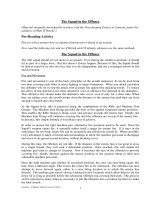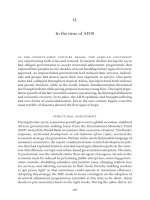Perfect tenses in the subordinate clause
Bạn đang xem bản rút gọn của tài liệu. Xem và tải ngay bản đầy đủ của tài liệu tại đây (11.72 KB, 1 trang )
Perfect tenses in the subordinate clause
In clauses with until, after and before, we often use present and past perfect tenses to show that one thing is
completed before another starts.
Study the following sentences.
We will not begin the work until they have agreed to our conditions.
I will come back after I have had my lunch.
He cannot be appointed before he has passed his examination.
I will telephone you after I have finished the work.
After he had completed his studies he went to America.
Note that the present perfect is used in the subordinate clause only when the verb in the main clause is either in
the present or future tense – not in the past tense.
A past perfect tense can be used in the subordinate clause when the verb in the main clause is in the simple past.
Instead of the perfect tenses, we can often use –ing forms.
Study the following sentences.
I will come back after having my lunch.
After completing his studies he went to America.
After completing this form give it to the secretary.
To talk about past events we can often use having + past participle.
He published his first book after having returned from Africa. OR He published his first book after
returning from Africa. OR He published his first book after he had returned from Africa.
Note that –ing forms are possible only when the main clause and the subordinate clause have the same subject.
Stay on top of your writing! Download our grammar guide from www.englishgrammar.org to stay up-to-date.
Powered by TCPDF (www.tcpdf.org)









